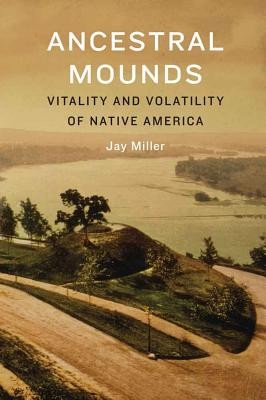
- We will send in 10–14 business days.
- Author: Jay Miller
- Publisher: University of Nebraska Press
- ISBN-10: 0803278667
- ISBN-13: 9780803278660
- Format: 15.2 x 22.9 x 1.6 cm, kieti viršeliai
- Language: English
- SAVE -10% with code: EXTRA
Reviews
Description
Ancestral Mounds deconstructs earthen mounds and myths in examining their importance in contemporary Native communities. Two centuries of academic scholarship regarding mounds have examined who, what, where, when, and how, but no serious investigations have addressed the basic question, why? Drawing on ethnographic and archaeological studies, Jay Miller explores the wide-ranging themes and variations of mounds, from those built thousands of years ago to contemporary mounds, focusing on Native southeastern and Oklahoma towns. Native peoples continue to build and refurbish mounds each summer as part of their New Year's celebrations to honor and give thanks for ripening maize and other crops and to offer public atonement. The mound is the heart of the Native community, which is sustained by song, dance, labor, and prayer. The basic purpose of mounds across North America is the same: to serve as a locus where community effort can be engaged in creating a monument of vitality and a safe haven in the volatile world. Jay Miller is an independent researcher and writer. He is the author of more than a dozen books, including Mourning Dove: A Salishan Autobiography (Nebraska, 1990), Lushootseed Culture and the Shamanic Odyssey: An Anchored Radiance (Nebraska, 1999), and Tsimshian Culture: A Light through the Ages (Nebraska, 1997). Alfred Berryhill was twice elected second chief of the Creek Nation, then head of the Cultural Preservation Office, Muscogee (Creek) Nation.
EXTRA 10 % discount with code: EXTRA
The promotion ends in 22d.09:59:41
The discount code is valid when purchasing from 10 €. Discounts do not stack.
- Author: Jay Miller
- Publisher: University of Nebraska Press
- ISBN-10: 0803278667
- ISBN-13: 9780803278660
- Format: 15.2 x 22.9 x 1.6 cm, kieti viršeliai
- Language: English English
Ancestral Mounds deconstructs earthen mounds and myths in examining their importance in contemporary Native communities. Two centuries of academic scholarship regarding mounds have examined who, what, where, when, and how, but no serious investigations have addressed the basic question, why? Drawing on ethnographic and archaeological studies, Jay Miller explores the wide-ranging themes and variations of mounds, from those built thousands of years ago to contemporary mounds, focusing on Native southeastern and Oklahoma towns. Native peoples continue to build and refurbish mounds each summer as part of their New Year's celebrations to honor and give thanks for ripening maize and other crops and to offer public atonement. The mound is the heart of the Native community, which is sustained by song, dance, labor, and prayer. The basic purpose of mounds across North America is the same: to serve as a locus where community effort can be engaged in creating a monument of vitality and a safe haven in the volatile world. Jay Miller is an independent researcher and writer. He is the author of more than a dozen books, including Mourning Dove: A Salishan Autobiography (Nebraska, 1990), Lushootseed Culture and the Shamanic Odyssey: An Anchored Radiance (Nebraska, 1999), and Tsimshian Culture: A Light through the Ages (Nebraska, 1997). Alfred Berryhill was twice elected second chief of the Creek Nation, then head of the Cultural Preservation Office, Muscogee (Creek) Nation.


Reviews